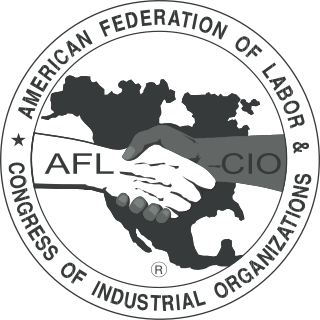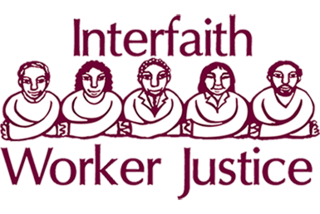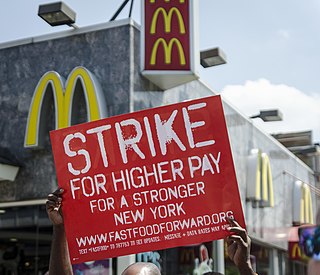Related Research Articles

The American Federation of Labor and Congress of Industrial Organizations (AFL-CIO) is a national trade union center that is the largest federation of unions in the United States. It is made up of 60 national and international unions, together representing more than 12 million active and retired workers. The AFL-CIO engages in substantial political spending and activism, typically in support of progressive and pro-labor policies.

The United Farm Workers of America, or more commonly just United Farm Workers (UFW), is a labor union for farmworkers in the United States. It originated from the merger of two workers' rights organizations, the National Farm Workers Association (NFWA) led by César Chávez and Dolores Huerta and the Agricultural Workers Organizing Committee (AWOC) led by organizer Larry Itliong. They allied and transformed from workers' rights organizations into a union as a result of a series of strikes in 1965, when the Filipino American and Mexican American farmworkers of the AWOC in Delano, California, initiated a grape strike, and the NFWA went on strike in support. As a result of the commonality in goals and methods, the NFWA and the AWOC formed the United Farm Workers Organizing Committee on August 22, 1966. This organization was accepted into the AFL–CIO in 1972 and changed its name to the United Farm Workers Union.

The nature and power of organized labor in the United States is the outcome of historical tensions among counter-acting forces involving workplace rights, wages, working hours, political expression, labor laws, and other working conditions. Organized unions and their umbrella labor federations such as the AFL–CIO and citywide federations have competed, evolved, merged, and split against a backdrop of changing values and priorities, and periodic federal government intervention.

Service Employees International Union (SEIU) is a labor union representing almost 1.9 million workers in over 100 occupations in the United States and Canada. SEIU is focused on organizing workers in three sectors: healthcare, including hospital, home care and nursing home workers; public services ; and property services.

John Joseph Sweeney was an American labor leader who served as president of the AFL–CIO from 1995 to 2009.

Labor unions represent United States workers in many industries recognized under US labor law since the 1935 enactment of the National Labor Relations Act. Their activity today centers on collective bargaining over wages, benefits, and working conditions for their membership, and on representing their members in disputes with management over violations of contract provisions. Larger labor unions also typically engage in lobbying activities and electioneering at the state and federal level.
Worker centers are non-profit community-based mediating organizations that organize and provide support to communities of low wage workers who are not already members of a collective bargaining organization or have been legally excluded from coverage by U.S. labor laws. Many worker centers in the United States focus on immigrant and low-wage workers in sectors such as restaurant, construction, day labor and agriculture.

The Oregon American Federation of Labor and Congress of Industrial Organizations (ORAFL–CIO) is the Oregon state affiliate of the AFL–CIO, the largest union federation in the United States.
The Labor Council for Latin American Advancement (LCLAA) is a nonprofit, nonpartisan Latino organization affiliated with the AFL-CIO and the Change to Win federation. It was founded in 1972 to provide Latino trade union members in the United States with a more effective voice within the AFL-CIO, to encourage Latino participation in the democratic process, and to encourage the organization of Latino workers into labor unions.

Working America is the political organizing arm of the AFL–CIO. Its membership is made up of non-union individuals. It is the largest non-union workers' group in the United States, with a self-reported membership of 3.2 million individuals. Working America advocates for progressive policy issues. The organization recruits people in working-class neighborhoods on their doorsteps in an effort to persuade them to support labor-backed candidates at election time.

Interfaith Worker Justice (IWJ) was a nonprofit and nonpartisan interfaith advocacy network comprising more than 60 worker centers and faith and labor organizations that advanced the rights of working people through grassroots, worker-led campaigns and engagement with diverse faith communities and labor allies. IWJ affiliates took action to shape policy at the local, state and national levels.

Emil Rieve was an American labor leader. He was president of the Textile Workers Union of America (TWUA) from 1939 to 1956, a vice president of the Congress of Industrial Organizations (CIO) from 1939 to 1955, and a vice president of the AFL-CIO from 1955 to 1960.
The Martin Luther King, Jr. County Labor Council (MLKCLC) is the central body of labor organizations in King County, Washington. The MLKCLC is affiliated with the national AFL–CIO, the central labor organization in the United States, which represents more than 13 million working people. Over 125 organizations are affiliated with the MLKCLC, and more than 75,000 working men and women belong to Council-affiliated organizations. In addition to supporting labor organizations, it acts as a voice for the interests and needs of the working people in King County, WA.
The 1935Pacific Northwest lumber strike was an industry-wide labor strike organized by the Northwest Council of Sawmill and Timber Workers Union (STWU). The strike lasted for more than three and a half months and paralyzed much of the lumber industry in Northern California, Oregon and Washington state. Although the striking workers only achieved part of their demands, the repercussions of the long and often violent strike were felt for decades. Over the next several years, a newly radicalized and militant generation of lumber workers would go on to spark several more industry-wide strikes.

The Fight for $15 is an American political movement advocating for the minimum wage to be raised to USD$15 per hour. The federal minimum wage was last set at $7.25 per hour in 2009. The movement has involved strikes by child care, home healthcare, airport, gas station, convenience store, and fast food workers for increased wages and the right to form a labor union. The "Fight for $15" movement started in 2012, in response to workers' inability to cover their costs on such a low salary, as well as the stressful work conditions of many of the service jobs which pay the minimum wage.

The International Longshore and Warehouse Union (ILWU) is a labor union which primarily represents dock workers on the West Coast of the United States, Hawaii, and in British Columbia, Canada; on the East Coast, the dominant union is the International Longshoremen's Association. The union was established in 1937 after the 1934 West Coast Waterfront Strike, a three-month-long strike that culminated in a four-day general strike in San Francisco, California, and the Bay Area. It disaffiliated from the AFL–CIO on August 30, 2013.

The Congress of Industrial Organizations (CIO) was a federation of unions that organized workers in industrial unions in the United States and Canada from 1935 to 1955. Originally created in 1935 as a committee within the American Federation of Labor (AFL) by John L. Lewis, a leader of the United Mine Workers (UMW), and called the Committee for Industrial Organization. Its name was changed in 1938 when it broke away from the AFL. It focused on organizing unskilled workers, who had been ignored by most of the AFL unions.

David Rolf is an American labor leader, writer, and speaker. He was the Founding President of Seattle-based Local 775 of the Service Employees International Union (SEIU), which represents health care workers, and formerly served as international vice president of SEIU. He is the author of The Fight for Fifteen: The Right Wage for a Working America about the movement by low-wage workers to earn a higher minimum wage, and A Roadmap to Rebuilding Worker Power. Rolf was a founder of the Fair Work Center in Seattle, Working Washington, The Workers Lab in Oakland, and the SEIU 775 Benefits Group.

The Coors strike and boycott was a series of boycotts and strike action against the Coors Brewing Company, based in Golden, Colorado, United States. Initially local, the boycott started in the late 1960s and continued through the 1970s, coinciding with a labor strike at the company's brewery in 1977. The strike ended the following year in failure for the union, which Coors forced to dissolve. The boycott, however, lasted until the mid-1980s, when it was more or less ended.
Lonnie Nelson (1932–2014), also known as Madelon Nelson and Madelon S. Healy, was an American labor, peace, civil rights, social justice, and Indigenous peoples activist in Seattle, Washington in the United States.
References
- ↑ Strom, Stephen (14 March 2017). "Seattle Author Jonathan Rosenblum on the Struggle for a $15 Minimum Wage". Seattle Magazine. Retrieved 5 August 2017.
- ↑ Greenhouse, Steven (26 July 1999). "JOE HILL IN HIGH TECH: A special report.; Unions Need Not Apply". The New York Times. Retrieved 5 August 2017.
- ↑ David Kusnet, "Love the Work, Hate the Job: Why America’s Best Workers Are More Unhappy than Ever," 2008 (Hoboken, New Jersey: John Wiley & Sons), pages 121–133.
- ↑ Roseth, Bob. "Labor activists, academics come together for lectures and symposia on strikes". UW News. Retrieved 5 August 2017.
- ↑ "Charges to Be Dismissed in WTO Arrests". IATP. Retrieved 5 August 2017.
- ↑ Gross, Ashley (22 July 2013). "Seatac Businesses, Unions Stage Showdown over Minimum Wage". KNKX.
- ↑ Bensman, David (12 July 2016). "Seattle Progressives Fight Inequality: Teamsters Take on Uber". The American Prospect. Retrieved 5 August 2017.
- ↑ Gross, Ashley (11 May 2016). "Alaska Air Stymies Would-Be Protesters With Online-Only Shareholders Meeting". KNKX.
- ↑ Wheeler, Tim. "Labor stalwart Lonnie Nelson dies at 83." Chicago, Illinois: The People's World, February 14, 2014.
- ↑ "BEYOND $15 by Jonathan Rosenblum". Kirkus Reviews. Retrieved 5 August 2017.
- ↑ Deignan, Tom (2 May 2017). "A new path for unions in America". America Magazine. Retrieved 5 August 2017.